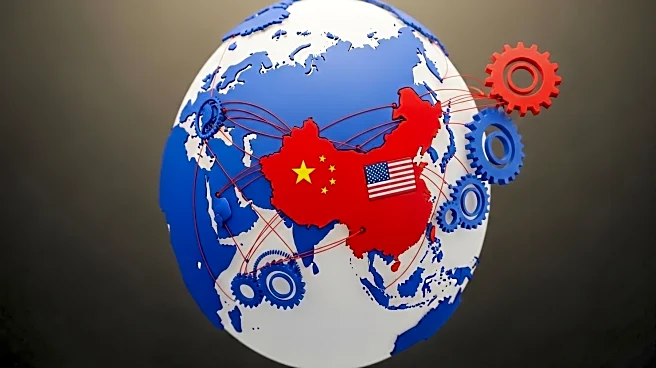What's Happening?
Korean companies are facing significant challenges due to the ongoing trade conflict between the United States and China. The two largest global economies have engaged in economic retaliations, which are seen as strategic moves ahead of a potential summit in Korea. The Chinese Ministry of Commerce has announced tighter export controls on rare earth metals, crucial for semiconductor equipment and electric vehicle motors. Korean manufacturers, despite having stockpiles, may experience production delays if export approvals are postponed. Concurrently, the U.S. Trade Representative's office plans to impose maritime fees on foreign-built vehicle carriers and LNG vessels, affecting Korean shipping firms like Hyundai Glovis. These fees, set to begin Tuesday, could lead to substantial financial losses for Hyundai Glovis, which transports vehicles for Hyundai Motor and Kia.
Why It's Important?
The trade tensions between the U.S. and China have significant implications for Korean industries, particularly in the semiconductor, automotive, and shipping sectors. The restrictions on rare earth metals could disrupt production and supply chains, affecting global competitiveness. The new U.S. maritime fees could increase operational costs for Korean shipping companies, impacting their profitability and market position. Additionally, the broader economic uncertainty may lead to volatility in the Korean stock market, as seen with recent declines in U.S. indices following President Trump's tariff threats. These developments underscore the interconnectedness of global economies and the potential ripple effects of geopolitical conflicts.
What's Next?
As the situation unfolds, Korean companies and government officials are likely to engage in negotiations with China to mitigate the impact of export controls. Hyundai Glovis and other shipping firms may seek to optimize their operations and collaborate with international partners to address the new maritime fees. Investors and business leaders will closely monitor the upcoming Asia-Pacific Economic Cooperation summit, where potential diplomatic resolutions between President Trump and Chinese President Xi Jinping could influence future trade policies. The outcome of these discussions may determine the trajectory of the trade conflict and its impact on Korean industries.
Beyond the Headlines
The trade war highlights the strategic importance of rare earth metals in modern technology and the vulnerabilities of global supply chains. It also raises questions about the sustainability of current trade practices and the need for diversification in sourcing critical materials. The situation may prompt Korean firms to explore alternative markets and suppliers to reduce dependency on Chinese exports. Additionally, the geopolitical tensions could lead to shifts in international alliances and trade agreements, influencing long-term economic strategies for affected countries.









